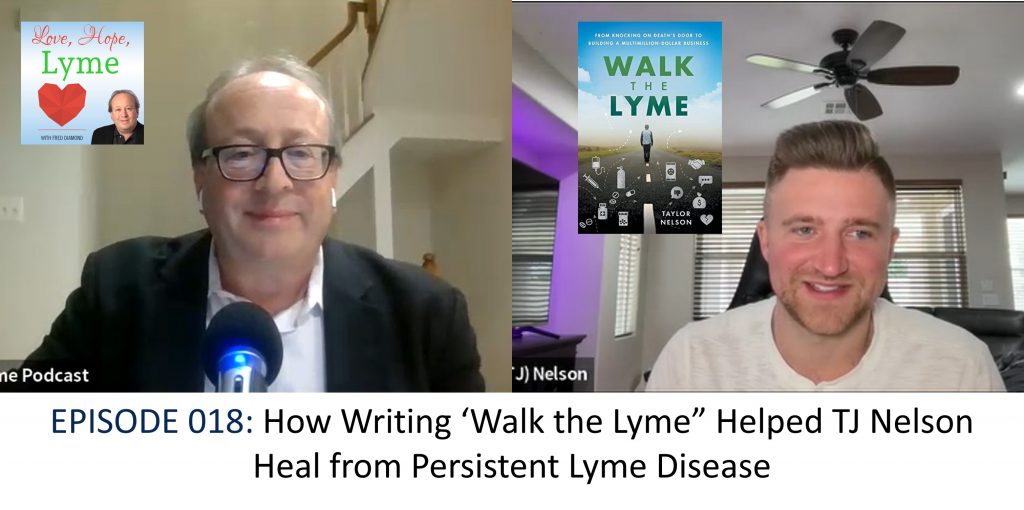How writing “Walk the Lyme” helped TJ Nelson heal

By Fred Diamond
On this week’s Love, Hope, Lyme podcast, persistent Lyme survivor TJ Nelson discusses how writing a book has helped him on his Lyme healing journey.
Several years ago, when I decided to learn more about Lyme disease, I read every book on it that I could find. Here’s a link to a blog I wrote in 2021 about my 12 favorites. I put them into three categories.
There were a few comprehensive and well-researched books, typically written by Lyme-literate medical doctors. There were also many niche books covering topics such as diet, mindfulness, and specific treatments, such as with herbals.
Thirdly, there were the personal healing books, in some cases written by celebrities who have battled persistent Lyme. They are often heart-wrenching, detailed, and emotional.
TJ’s new book Walk the Lyme: From Knocking on Death’s Door to Building a Multimillion-Dollar Business fits that category. It’s a brave account of his struggles, challenges, and successes. It was very inspirational and could help many Lyme survivors in their recovery journey.
Why he wrote the book

I originally met TJ when I interviewed him in 2021 for my Sales Game Changers Podcast. On that show, I interview sales professionals who are successful despite having to deal with tick-borne illness. He provided so much value in the interview that I included a large portion of the transcript in my book “Love, Hope, Lyme: What Family Members, Partners, and Friends Who Love a Chronic Lyme Survivor Need to Know.”
On the podcast, he talks about the level of commitment and urgency he needed to grow his solar business while struggling with Lyme. He uses the analogy of forcing himself to make hundreds of calls to grow sales even though it’s hard and something that most people don’t want to do. To expand his business, he had to push himself and do activities he frequently did not want to do, which was analogous to his Lyme recovery.
“Lyme patients are dealing with negative thoughts on an unimaginable level. They have fatigue which makes everything difficult. Even brushing your teeth can feel like running a marathon when you’re that bad,” he says.
“There’s depression and confusion. They probably have not fully shared the level of hell they are going through because people around them can’t handle it. When a Lyme person is in pain all the time, they must keep it to themself. Otherwise, it’s too heavy and too dark. A lot of times they’re going to be in extremely dark places.”
How family and friends can best support a loved one
TJ says the Lyme journey can confuse family and friends who do not have the disease.
“During the Lyme journey, there were some ups and downs, and I learned to not share the ups as much, because then people would think you’re better and would get confused when you fall back down,” he says.
He says when he was feeling better and had some energy, people would think he was cured and then would be skeptical when the inevitable down would happen.
“I’m doing well now, but there are still some things I deal with,” he says. “But I had constant, nonstop suicidal thoughts for five years straight. Those went away about a year ago.”
He suggested that friends and family not share their treatment suggestions, no matter how sincere they may be. “Don’t say things like ‘My friend knows a plant that’ll cure you’ or ‘Just take doxycycline.’”
“Lyme is so different, so varying for each survivor. Whatever you know about Lyme could be very different from what this person has or is experiencing with the combination of co-infections, the way it’s affecting them. When people offer advice, I don’t take it personally anymore. I just think, “You don’t know much about Lyme, but it’s okay.”
He said family and friends need to expect there’s going to be a lot of mental anguish. “There’s going to be a lot of stuff that you’re not going to understand. I’m doing some wild, crazy stuff that probably looked weird. Bartonella gave me a lot of anger. They might be doing a lot of stuff that might seem like they’re pushing people away but they’re not.”
He surmises, “A lot of times with Lyme, you just need to be with someone and have fun with it. My friends that would joke about it with me, but at the same time they’re there for me and that was a good combination. Instead of feeling like I’m some weird, damaged person, they just made light of but were there for me at the same time.”
Getting used to feeling good
“There are times where I feel good and I’m having to learn how to handle feeling good, because it’s foreign. For example, I got some energy and did some things, but then I hurt myself a little bit. It almost feels like a prisoner breaking out of a prison cell. I just want to do everything, but you must remind yourself that you’re still healing.”
TJ says he wrote the book to say goodbye to the Lyme disease.
“My test results show that Lyme is not active anymore, but Bartonella is still there. What I’m doing is rebuilding mitochondria, repairing the damage, learning to keep my body in a coherent, healthy state. But right now, compared to how I used to feel, I am so glad that I never gave up, because it’s way better.”
He suggests, “Keep trying everything and keep moving forward. If something doesn’t work, then try something else. You learn something when things don’t work. Just keep going, I promise, it’ll be worth it.”
You can order TJ’s book here.
Click here to listen to all episodes of the Love, Hope, Lyme Podcast or on YouTube.
Fred Diamond is based in Fairfax, VA and can be contacted via Facebook. His book, “Love, Hope, Lyme: What Family Members, Partners, and Friends Who Love a Chronic Lyme Survivor Need to Know” is available on Amazon. The e-version of the book is always free to Lyme survivors. Send Fred a private message on Facebook for your copy.




















We invite you to comment on our Facebook page.
Visit LymeDisease.org Facebook Page